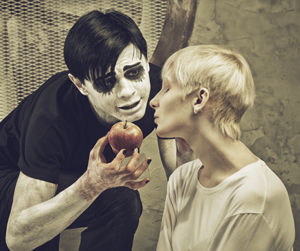
|
There is a lot of talk these days—and a lot of public confusion—about the role of sex or gender, and the choice of a person’s “preferred” sex or gender, in daily life as a matter of personal identity. Well, people can imagine for themselves almost any kind of life, some possible, some improbable, and some downright daft. But thinking does not make it so. Even hormone therapy and the surgeon’s knife cannot counter the effects of X and Y chromosomes and the basic structure of biology.
And yet, notions about gender are fluid, not fixed. And still, they are not all that important in daily life.
As a writer trying to appeal to all sorts of readers, I include in my books both male and female characters. And to write as I do—where each scene in an ensemble novel is told from the viewpoint and limited perspective of a dominant character, rather than by an “omniscient narrator” who skips from viewpoint to viewpoint in a single passage—I often have to adopt the mind and perspective of female characters. This can be tricky and invite the scorn of women readers who know that I am a man. But to date I have not yet had such a complaint.
What is my secret? I look for the core of the character. What drives him or her? What does he or she want to achieve or avoid in the story? What is most important in this moment of actual perception in the storyline?
Since I mostly write science fiction or adventure fiction, and some family history, this is relatively easy. The character wants to survive, to solve a specific and pressing problem, or to learn an important truth. And the character, absent the problem or risk to life and limb, still wants what all human beings want: self-expression, autonomy of action, and the respect of those around them. Whether you are a man or a woman, you are first a human being functioning in a complex and technological society. For most of your life—and most of the story you are in—issues of when and how you achieve sexual satisfaction; the presence, or absence, and function of breast tissue; and whether your genitalia are internal or external and how you arrange them in your pants, all of these considerations are secondary. You do not think about them while you are arguing about a discovery, wrestling with a knotty problem, or running for your life. But you do think about the motives of the people you are with and the meaning of what’s going on in the moment.
The same pertains to people in real life, unless the person chooses to make gender and sexuality the main focus of their identity and perhaps the object of a horrific experiment. Most of us don’t. We think more about our roles as citizens, parents, practitioners of a particular trade or profession, readers, thinkers, storytellers, or whatever we happen to be doing at the time, more than we think about doing it as a man or woman, straight or gay, or whatever the current flavor might be.
To be trapped in a single identity, to give it major thought and concern, more important than other aspects of our life and personality, is an error. Some people may live that way. They may cling to a single facet of their lives and forget that they are a jewel that gleams in several dimensions. But such people don’t make for good storybook characters, role models, or the kind of head in which the reader wants to spend any amount of time.
Such thinking makes villains, maybe. Monomaniacs and psychotics are useful as villains, especially the laughable kind that we can look on with a certain amount of amused contempt. Such villains don’t need rounding out, complex motives, or humanizing characteristics. We don’t have to understand why they are driven to destroy the main character, or the good guys’ organization, or their society and the world itself. We don’t really care. Such villains are useful to drive a certain kind of plot forward without the reader stopping to ask what kind of person would do this and how far they would go before some sense of proportion or decency or self-preservation kicked in and made them say, “Hey, wait a minute!”
And stories where the main character is all about sex—thinks about it incessantly, does it every other page, and is always reaching down to adjust his crotch and thinking, “What a good boy am I!”—well, those stories are mostly pornography. That has its place, I guess. But on the whole, as a story, it’s contrived and … well, boring.
No, real characters have to be a simulation of real life. They have to be people the reader can appreciate and understand, if not identify with completely. And such people tend to be complex, multifaceted, active, and outward-looking.
Like the rest of us.
No comments:
Post a Comment